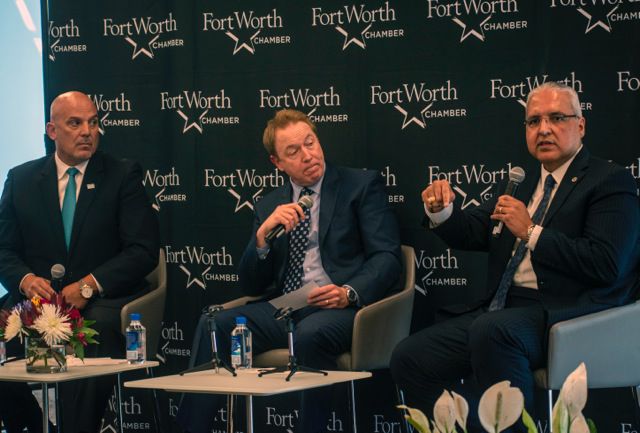The Fort Worth Chamber of Commerce hosted a panel discussion on the state of public education Sept. 12, focusing on the future workforce needs of the local business community.
About 300 community and business representatives attended the event, held at the PalmWood Event and Conference venue at the Frost Tower in downtown Fort Worth.
The panelists for the event were Fort Worth ISD Superintendent Kent Scribner and Arlington ISD superintendent Marcelo Cavazos. The two school districts oversee a combined total of more than 145,000 students in Tarrant County.
“They’re future engineers, doctors, chefs, welders, and these districts are designed to nurture the ambitions of a wide range of career paths for a diverse group of thinkers,” chamber chairman Lonnie Nicholson said. “Not only are we asking the question, ‘what do you want to be when you grow up?’ but we’re also providing a path for them to become just that.”
Greg Karol, vice president of Human Resources at Lockheed Martin Aeronautics, moderated the discussion.
Here are some of Karol’s questions and panelists’ answers during the discussion:
Q: What do you say to business leaders who believe high school students can’t be effective as interns at their businesses?
Cavazos: We have the counselors, the teachers, the people that work with the students, the courses, the curriculum, etc. Invest, use our resources. That’s what it’s for. Provide access to students in internships. And they exceed expectations, and often, and over and over. They exceed the expectations of the people they work with, but then they also outperformed the adults in the industry.
Scribner: We often hear about the need to improve our future workforce. That education and the economy are inextricably linked. And one thing we always say is systems, as they sit, are perfectly designed to get the outcomes that they’re getting.
Q: What are your school’s doing to prepare high school students for high demand jobs?
Scribner: Currently, we have 20,000 students in Fort Worth ISD that are participating in career and technical education through middle school all the way through high school. So again, listen, learn, lead. We need to work with our industry partners, identify what their needs are. We need to have a two-way flow of information so we can refine and focus our programming.
Cavazos: 65 percent of our juniors and seniors are taking courses at the Career Tech Center. Huge transformation with certifications and preparation for the workforce and for their career of choice. But it has to start early and that’s where we’re focused as well.
Q: What do you see as essential elements for the partnership with businesses?
Cavazos: I think essentially it is opening those doors for our students to have access into the industry. And that’s an essential part of any relationship from my perspective. Often when we speak to industry partners, the first thing I tell them is, we’re not coming for your money. We’re coming for your access. We’re coming for your talent that you have already to partner with our students.
Scribner: What we need to help business do, in a two-way flow of information, is move away from this deficit perspective that our students are broken, that our students are problems that need to be solved. They’re not problems that need to be solved. They’re assets that need to be invested in.
Q: How do you promote awareness of all your programs outside of just the general education stuff?
Scribner: Well from our perspective, we obviously have the social media output, the billboards, the magazines, the communication. But I think our students can also be the best ambassadors. These problems that we see when we talk about the disparities, we talk about the opportunities for some, but not for all in our communities. They’re intergenerational, they’re systemic, and unless we take bold action, they will not be solved.
Cavazos: We live in a world where everything is instant and it’s very brief. And I often say that the complexity of public education in a community and the economic development and poverty reduction and all those things, they’re not brief. We have to have some tolerance to have a discussion that’s more than 30 seconds about these issues. And I credit Arlington and Fort Worth, and actually an event like this where we’re coming together in a more regional sense,
Q: How important are certifications for a student’s career?
Cavazos: Those certifications are engaging to students. When I talk to parents of students who are earning a certification, the first thing they say is that they’ve never seen their students so engaged in school as now in the pursuit of certification or an internship or something that’s tangible for them.
Scribner: I think higher education plays a huge role here, too. The conduit between K-12 and business. I know we have a great partnership with TCC. It’s extremely important, not only from the certification perspective for students who are going into, immediately into a career but also the college.






